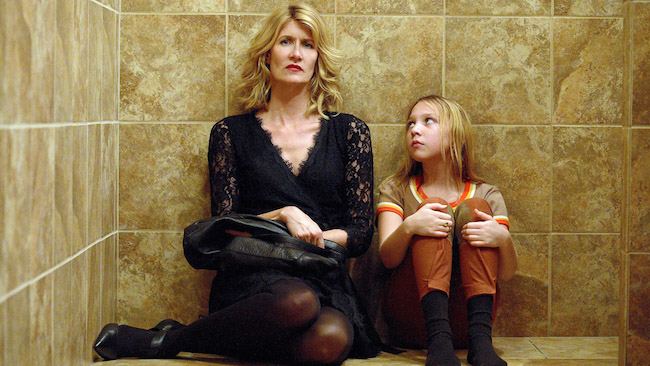
The Tale premiered Saturday here at the Sundance Film Festival and, as I write this, it’s Tuesday. Usually when a movie makes as big a splash at a festival at The Tale did, the idea is to rush to get a reaction piece up as soon as possible as a way to get ahead of, or be a part of, “the buzz.” And there’s nothing wrong with that, but, personally, I just couldn’t get myself to write about this particular movie that quickly. (Speaking to other festival press, I wasn’t the only one who felt this way.) This is a movie that absolutely deserves a longer period of consideration – and probably longer than even the three days I’m at right now. And it’s not just because it’s such a genius piece of filmmaking (and it is), but that this is a story about someone’s life – who just happens to be the writer and the director of the movie – and her response to her own sexual abuse as a 13-year-old child.
As opposed to writing out her story – as so many brave women have done when sharing stories of abuse at the hands of powerful men – filmmaker Jennifer Fox, instead delivers it in a narrative form that captures her own struggles with even remembering the truth about what happened. It starts when Jennifer (played by an outstanding Laura Dern) receives a correspondence from her mother (Ellen Burstyn) that includes an essay Jennifer had written as a little girl, detailing some of the events that happened one summer with her running coach, Bill (Jason Ritter) and her horseback instructor, Mrs. G (Elizabeth Debicki). This sends Jennifer on a quest to discover the truth about what happened because her memory deceives her. When we see flashbacks, at first Jennifer is an older teenager – but is later corrected that she was much younger and we see the same scenes again, only played by a much younger actor (Isabelle Nélisse).
During the course of the film, Jennifer struggles with her own memories of events since for many years she had taught herself to think of what happened in a certain way — a way that did not make her a “victim,” a word Jennifer despised. In one of the most powerful scenes, Jennifer’s fiancé (Common) uses the word “victim.” He can’t understand why she is defending the actions of these two monsters who abused her. But Jennifer refuses to be a victim, at least in her memories of what happened. She wants to remember that she had a lot more control over what had happened, but as the facts unravel, she has to face the truth about what happened when she was 13 and was raped by a 40-year-old mam.
It’s a powerful performance by Dern. And it’s very difficult to put into words what this movie does to a viewer, but it makes you understand. If Jennifer Fox stood on stage and tried to explain her feelings about what happened to her and why her memories weren’t always accurate, it wouldn’t have the same level of communication. I suspect a lot of us would be like Common’s character, wanting to just hate these people and not being able to understand why it’s a lot more complicated for Jennifer. But what this movie does is make you understand why it’s all so complicated for her as we live through her discovering more and more about what happened, culminating in a powerful ending that delivers some comeuppance, but obviously not nearly enough. (Hopefully, for the real Jennifer Fox, this movie does serve as that.)
The Tale is an extraordinary film, but also extremely difficult to watch. There are very uncomfortable scenes (in a post-film Q&A, Fox made it clear that a body double was used for every scene involving a sexual encounter) of an adult man having intercourse with a 13-year-old girl. It will make you feel incredibly awful. But this imagery is necessary to try to understand what Jennifer Fox went through. And making it worse, it’s Jason Ritter. We want to love Jason Ritter. We have been trained our whole lives to love the Ritter name. And of course, Ritter plays Bill as the nicest, sweetest man in the world, until he uses that sweet persona to get Jennifer to do things no child should have to ever worry about. After the film, onstage, Ritter couldn’t keep his emotions in check and openly wept. Sometimes moments like this have a tad of performance in them, but not this time. There’s no way an actor could play this kind of role and not just feel horrible about it.
The Tale is obviously being touted as a movie for the #MeToo movement and this will amplify its presence, which is a good thing. But I do think a movie like this – so powerful and so well made – would have found its voice regardless. It’s just too good of a film for it not to, and to be honest, I’ve never seen anything quite like it. This is mentioned because naysayers might just point to the movement and think, Well, that’s the only reason this is getting attention. That attitude is hogwash. This is an excellent, poignant, and amazing film that will stick with you. I can’t stop thinking about it. It’s a must-see, even though watching it is a very difficult thing to do.
You can contact Mike Ryan directly on Twitter.






